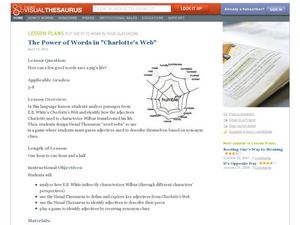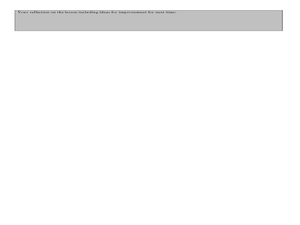Curated OER
Primary Source Analysis: 95 Theses Excerpts
By reviewing and analyzing these nine selected points from Martin Luther's 95 Theses, your young historians will discern the major tenets of the revolutionary challenge made against the Catholic Church in the seventeenth century. This is...
Curated OER
Excerpt from Livy's History of Rome
Investigate Rome through the eyes of Titus Livius Patavinus ("Livy"), a Roman historian whose book, History of Rome, is the focus of this text-analysis activity. A short excerpt gives scholars material to answer 3 comprehension and...
Curated OER
Excerpt: Cecil Rhodes' Confession of Faith (1877)
Consider the words of Cecil Rhodes after reading this short excerpt from his publication, Confession of Faith. Upper graders read the excerpt then answer two questions analyzing the view of Africans toward his praise of British...
Curated OER
Excerpt from E.D. Morel's The Black Man's Burden (1920)
The included excerpt would be a perfect contrary follow-up to reading, Rudyard Kipling's White Man's Burden. Journalist E.D. Morel composed the statement against imperialism in 1920. Black Man's Burden is a wonderful primary source...
Humanities Texas
Primary Source Worksheet: Lyndon B. Johnson, Excerpt from “The Great Society”
Young historians examine Lyndon Johnson's vision for a rich, powerful, and upward society as detailed in this excerpt from his famous "Great Society" speech presented at the University of Michigan in 1964.
Curated OER
Excerpt from Elizabeth Gaskell's Mary Barton (1848)
Answering document-based questions is a great way to build reading comprehension and critical thinking skills. Learners read an excerpt from Elizabeth Gaskell's Mary Barton, then answer two related questions.
Curated OER
Excerpt from Edward Bain's The History of Cotton Manufacture in Great Britain (1835)
Great Britain was where the industrial revolution began. The class reads an excerpt from a document written in 1835 describing cotton manufacture in Great Britain. They then answer two critical analysis questions.
Student Handouts
The Cold War: The Truman Doctrine of 1947
What was the Truman administration's position on foreign policy during the Cold War? Class members respond to an excerpt from President Harry S. Truman's "Truman Doctrine" with three questions in the space provided.
Thomas Jefferson Foundation
Personal Morals vs. Political Moves Document Based Essay
Was Thomas Jefferson a hypocrite? Tackle this question with primary source analysis and an essay. The packet includes historical background, a writing prompt, a combined outline and checklist, and ten primary documents paired with...
Humanities Texas
Primary Source Worksheet: Excerpt from Reagan's Speech to the National Association of Evangelicals
Ronald Reagan's 1983 speech to the National Association of Evangelicals (also know as the "Evil Empire Speech") offers readers with an opportunity to practice their skills at reading informational text, specifically primary source...
Curated OER
Teaching With Documents: U.S. Constitution Workshop
What does it mean to be American? Explore the constitution and what it really means to be a citizen here. First, learners of all ages will investigate different primary source documents. Then, they establish each document's...
Crafting Freedom
Creating Original Historical Fiction Using Henry "Box" Brown's Narrative and Runaway Slave Ads
Young historians discover the experiences of runaway slaves after reading the brief biography and narrative excerpt of Henry "Box" Brown, who escaped slavery by having himself shipped away in a crate and popularized his flight in a...
DocsTeach
Excerpts from the Declaration of Independence
What exactly did the Founding Fathers declare? Elementary historians delve into the Declaration of Independence in a fast-paced activity. The resource provides text experts and guided questions to help academics analyze the intent of the...
Humanities Texas
Primary Source Worksheet: Excerpt of Senate Bill Proposing an End to the Slave Trade
To sign or not to sign? That is the question facing readers of the 1807 bill proposing an end to the slave trade. After a close reading of excerpts from the bill, readers are asked to advise Thomas Jefferson either to sign or reject the...
City University of New York
Urban Politics: Machines and Reformers
Take a trip to the turn of the twentieth century with a resource about industrialism in America. With primary source documents and focus questions, learners think about the ways that government groups and organizations paved the way for...
Literacy Design Collaborative
Rhetorical Analysis for Pre-AP English
Scholars closely analyze the use of rhetorical strategies in several model texts. They work in groups to annotate the text identifying rhetorical elements, and to complete a Rhetorical Analysis chart and guided reading worksheet....
Curated OER
Analysis of the Diary of Narcissa Whitman
Seventh graders explore the West through the eyes of a settler. In this Westward Expansion lesson, 7th graders read excerpts from the diary of Narcissa Whitman as she journeyed West from Pennsylvania. Students respond to critical...
Curated OER
The Power of Words in Charlotte's Web
"How can a few good words save a pig's life?" Posed with this question, your ELD students explore E.B. White's Charlotte's Web in a meaningful, valuable way. By analyzing specific word choice from the book, especially the excerpts...
Curated OER
Excerpt from Eyewitness Accounts of Slavery in the Danish West Indies"
Use the power of primary sources to help young historians understand the conditions Africans endured while being shipped during the slave trade. After reading an excerpt from Eyewitness Accounts of Slavery in the Danish West Indies,...
Curated OER
Literary Response and Analysis Theme Literature
Analyze the central idea or literary theme found in a series of quotes from the Shakespearean play, Hamlet. For literary analysis, learners paraphrase excerpts from the play and then identify the characters' motivations for their speech.
K12 Reader
Two Viewpoints of the Same Event: Lee Surrenders to Grant, 1865
How did Union General Ulysses S. Grant view the surrender of Confederate General Robert E. Lee in 1865, which effectively ended the United States Civil War? After reading an excerpt from Grant's autobiography, your young historians will...
Great Books Foundation
I Shall Not Beg for My Rights
An excerpt from Henry MacNeal Turner's address to the Georgia legislature provides class members with an opportunity to develop their literary analysis skills. Prompted by the provided factual, evaluative, and interpretive questions,...
National Endowment for the Humanities
Frederick Douglass’s Narrative: Myth of the Happy Slave
The firsthand accounts of what it was like to be an enslaved person in the mid-1800s riveted a nation and the issue ultimately led to civil war. Using excerpts from Frederick Douglass's autobiography, budding historians examine what it...
American Battlefield Trust
1861: The Country Goes to War
What was it like to know the Civil War was coming? Using a graphic timeline activity and excerpts of speeches from Abraham Lincoln and Jefferson Davis, learners consider the early days of the conflict. The resource includes prompts for...

























